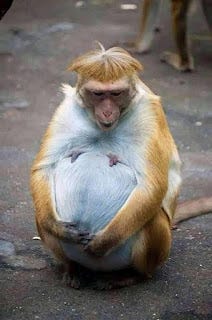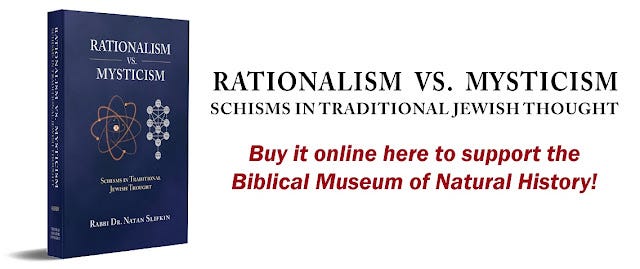The Turning of the Tide?
Rabbi Dovid Lichtenstein (henceforth RDL) has a popular podcast called Headlines, in which he sometimes asks tough questions of the people that he interviews - a rarity in the charedi world. In his latest episode, on the topic of Chazal's knowledge of science, he interviews five people.
First, he interviews Professor Maoz Kahana, a sort-of-charedi professor of Jewish history from Tel Aviv University. This is itself significant - that a discussion of this topic, interviewing Gedolei Roshei Yeshivah, also asks academics for their view. (Unfortunately, Prof. Kahana's English is not that great, and it is quite difficult to follow.) RDL tries to pin him down on whether statements about all knowledge being in the Torah mean that the Tannaim could extract science from the Torah. Kahana responds by pointing out that it also stated that every Torah insight that anyone will ever expound is already in the Torah. And just as that does not mean that the Tannaim could extract any Torah insight, they likewise could not extract scientific knowledge.

Next, RDL interviews Rav Mendel Shafran from Bnei Brak. Much to my surprise (since Rav Shafran endorsed anti-science quackery), he gives a very reasonable approach. In a very memorable quote, he says, "My wife can make a better kugel than Moshe Rabbeinu, and it's not kefirah to say so!" He explains that it's not a deficiency for Chazal not to know something about science. This is a very important point that many people in the charedi world are unable to grasp, and it's refreshing to hear it being presented.
Then RDL interviews Rav Dovid Cohen, who is extremely disappointing. He invokes "sod Hashem liyreyav" to argue that Chazal had hidden sources of knowledge - but as I point out in my book Rationalism vs. Mysticism, Chazal only invoked that principle as a theoretical possibility in three cases, and clearly did not see it as being generally operative. Rav Cohen naively claims that Chazal knew lots of things before modern science. I've investigated dozens of such claims, and in every case, I found that it was either (a) something that non-Jews in antiquity also knew, (b) something ambiguous that could be interpreted in all kinds of ways, or (c) something that is not actually true. Rav Cohen adds that we can "never" be sure if they are speaking literally or not (which is easy to say about aggadata, but not at all regarding other areas). But then when RDL points out that R. Yehuda HaNasi says regarding dispute regarding the sun's path at night that the non-Jews appear correct, Rav Cohen admits that it could be.
Next, RDL introduces R. Moshe Meiselman. Alas, RDL mistakenly claims that he is "uniquely qualified to speak about this topic" since he is a graduate of MIT. In fact, his degree was in mathematics, which is entirely irrelevant to expertise the natural sciences, and may even be detrimental to it. And as for the college courses on science, Rabbi Meiselman goes against the entire consensus of scientists in the natural sciences, who would consider his approach regarding the world being only a few thousand years old to be ludicrous. Would we speak about the credibility of a self-styled medical expert who did college courses on medicine but is deemed to be a crank by the entire medical establishment?
RDL begins by asking Rabbi Meiselman about Rav Soloveitchik's take on these issues. R. Meiselman responds by saying "Rav Soloveitchick never said Chazal chas v'shalom made a mistake.. no serious talmid chacham ever said that." Of course, the fact is that very many serious talmidei chachamim said exactly that... including pretty much all the distinguished talmidim of Rav Soloveitchik, such as Rav Hershel Schachter! I am more inclined to believe that Rav Soloveitchik's talmidim accurately reflected his approach, rather than that they all turned out to be heretics.
Then, RDL asks about the Gemara in Pesachim regarding the dispute about the sun's path at night, where the chachmei Yisrael took the position that the sun goes behind the sky, and R. Yehuda HaNasi notes that they appear to be mistaken. Rabbi Meiselman claims that these chachmei Yisrael were astronomers rather than Torah sages, and thus it was a dispute regarding astronomy and not Torah, regarding which R. Yehuda HaNasi had no mesorah. Alas, RDL is not familiar enough with the topic to point out to Rabbi Meiselman that the position of the chachmei Yisrael is espoused by Tannaim in Bava Basra and Midrash Bereishis Rabbah, in which they base it on their understanding of pesukim.
Rabbi Meiselman is also hasty to stress that there are many Acharonim who claim that the Gemara means something entirely different anyway. Indeed there were - Rabbi Meiselman is not the first to be uncomfortable with Chazal not knowing where the sun goes at night. Still, surely the approach of all the Rishonim, still continued by many Acharonim, should hold greater weight.
RDL pushes further. If the Sanhedrin can make a mistake about halacha, he asks, why can't Chazal make a mistake about science? Rabbi Meiselman's response is that "the Gemara is definitive." Which hardly seems to answer the question.

Then RDL asks about the Gemara's statements regarding the gestation periods of various animals. Rabbi Meiselman responds that "there are specific snakes that do have a gestation of seven years." Alas, this is not actually true. And unfortunately, RDL does not question him about the Gemara's statements that the gestation of the wolf, lion, bear, leopard, cheetah, elephant, and monkey, is three years. Perhaps someone can ask Rabbi Meiselman about this? Were Chazal also only speaking about particular types of wolf, lion, bear, leopard, cheetah, elephant and monkey that are unknown to modern science?
Finally, when RDL asks about the mouse that is generated from dirt, Rabbi Meiselman states emphatically that "Chazal did not believe that there is a spontaneously generating mouse." Of course, just as in his book, Rabbi Meiselman neglects to address the fact that Chazal had a derashah from the Torah specifically for the mud-mouse.
RDL summarizes the situation as there being three views: that Chazal were fallible, that they spoke in metaphor, and that they were infallible. And he concludes by saying that he doesn't see any reason that Chazal's statements about science should be considered "halacha pesuka."
Frankly, I think that this is amazing. It's only been seventeen years since the charedi Gedolim declared it unthinkable and heretical to say that Chazal could have been mistaken on science. And now a prominent charedi radio host, based on an interview with a prominent charedi Rav, says that such a view is within the spectrum of legitimate views! It seems that the tide may be turning.



